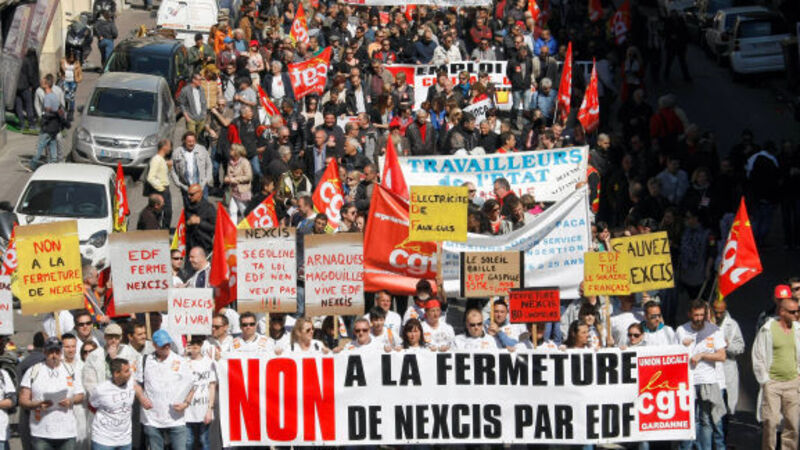Thousands march amid French strike

Thousands of protesters, many blowing whistles and waving union flags, marched through Paris and other French cities on a day of nationwide strikes that kept many children out of school, forced the closure of the Eiffel Tower and cancelled some 2,000 flights in and out of France.
Stepping up pressure on President Francois Hollande’s already-unpopular Socialist government, the protesters aired an array of grievances against state funding cuts, planned increases in the retirement age and business-friendly reforms that could make firing workers easier.
The strikes, called by key unions such as the Communist-backed CGT, in the protest-friendly country follow recent complaints by groups as diverse as doctors and notaries against new government reforms, and come on top of ongoing strikes by air traffic controllers and workers at state radio.
Workers have traditionally made up the bedrock of support for Mr Hollande’s Socialists, and the protests suggested that his government’s recent move to the political centre – including with business-friendly reforms – has rankled many on the left.
Analyst Pascal Perrineau said the mishmash of movements suggested that Mr Hollande, who has cast himself as primarily a negotiator since he was elected in 2012, has not been clear enough with the French about his plans for getting the economically struggling country back on track.
“This proves that, if you will, he (Mr Hollande) has lost control. When you’re the president, it’s not enough to be a negotiator. You have to be able to fix a clear line for everyone,” said Mr Perrineau, a professor at Paris’s Sciences Po political university.
The air traffic controllers were holding the second half of a two-day strike. It led to the cancellation of some 2,000 flights, mostly short- and medium-haul routes, in and out of France on Thursday, according to Eric Heraud, spokesman for the French civil aviation agency DGAC.
Their walkout, in part over plans to raise their maximum retirement age to 59, was expected to resume in each of the next two weeks. Many European carriers were avoiding French airspace.
Employees at Radio France, the state-backed broadcaster, were entering the third week of their walkout to protest against budget cuts.
Railway workers, healthcare providers, teachers and energy sector personnel and others honoured Thursday’s general strike, partially to register discontent against the government’s proposed so-called “Macron Law” that would reduce workplace protections coveted by many French employees.
“All the established social rights of our labour law are being questioned with this bill,” said Nicolas Mas, a teacher marching in Paris. “We are back to the nineteenth century. It is incredible. A total loss of all the benefits of the working class obtained through years.”
The CGT’s website laid out 10 of its reasons for employees to stay off the job - such as to end wage stagnation for state workers, demand equal pay for women and men and defend the state-supported healthcare system.
A spokeswoman for the Eiffel Tower said it closed because many employees of the famed Paris landmark took part in the protest in solidarity with the overall movement. A sign out front said it was closed until 6.30pm local time, frustrating some eager would-be visitors.
“The Eiffel Tower closed because of the strike in the peak season, it’s kind of disappointing,” said Diane Powell, a 49-year-old tourist from New York.













